Travel & Tourism: A Research Project on Technology's Influence
VerifiedAdded on 2024/06/05
|32
|6183
|269
Project
AI Summary
This research project investigates the influence of technology on the travel and tourism sector, focusing on how digital advancements impact business operations, customer experiences, and overall industry growth. The study formulates research questions to determine the significance of technology, its positive and negative impacts, and key areas for technological development within the industry. It includes a literature review, a research project specification outlining qualitative and quantitative research methods, and a plan for data collection through questionnaires. The project also addresses ethical considerations, resource allocation, data analysis, and recommendations for further research, culminating in a poster presentation to disseminate the findings. The goal is to provide insights into the role of technology in enhancing the effectiveness and profitability of the travel and tourism sector, while also improving customer satisfaction and loyalty. Desklib provides access to this and other solved assignments for students.
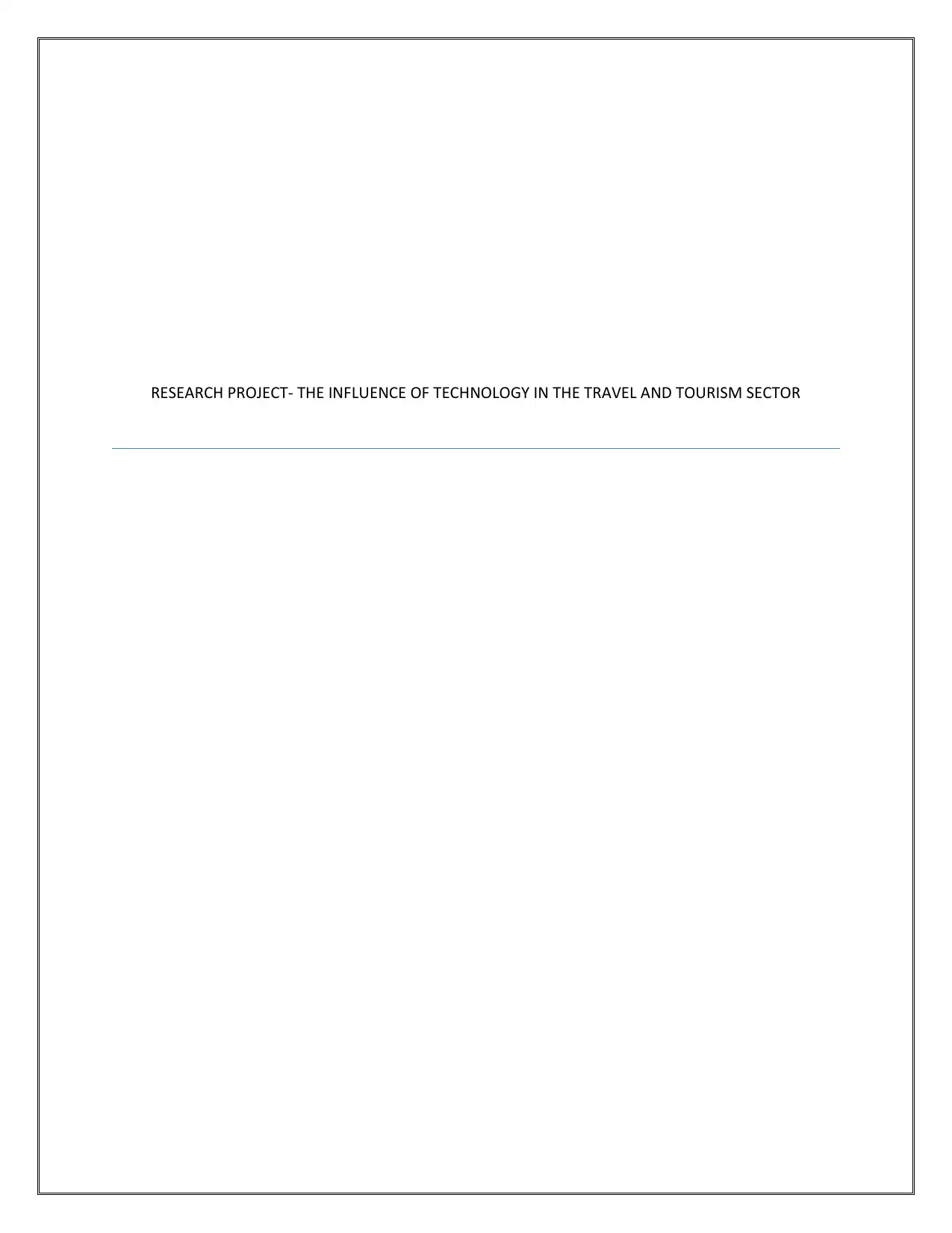
RESEARCH PROJECT- THE INFLUENCE OF TECHNOLOGY IN THE TRAVEL AND TOURISM SECTOR
Paraphrase This Document
Need a fresh take? Get an instant paraphrase of this document with our AI Paraphraser
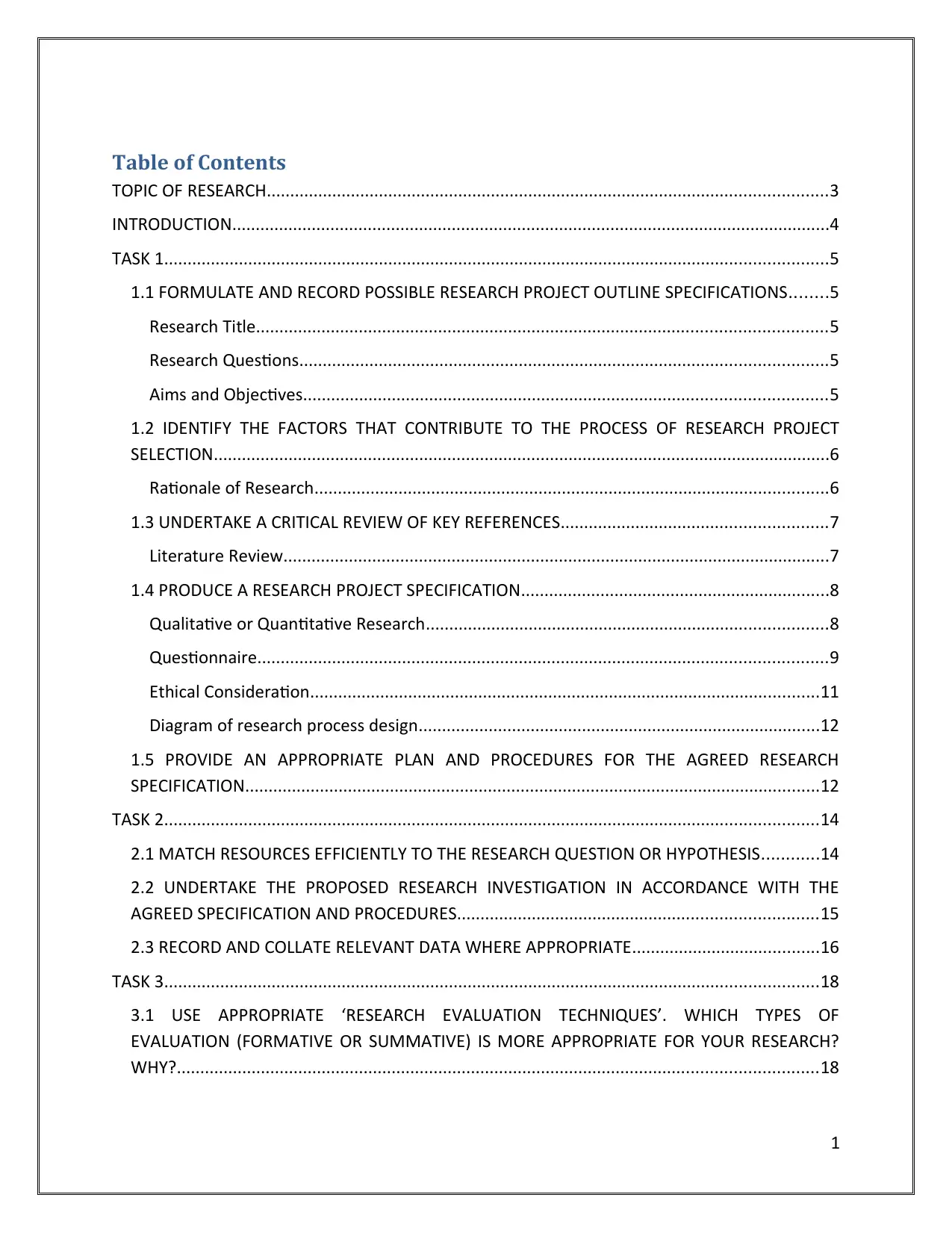
Table of Contents
TOPIC OF RESEARCH........................................................................................................................3
INTRODUCTION................................................................................................................................4
TASK 1..............................................................................................................................................5
1.1 FORMULATE AND RECORD POSSIBLE RESEARCH PROJECT OUTLINE SPECIFICATIONS........5
Research Title..........................................................................................................................5
Research Questions.................................................................................................................5
Aims and Objectives................................................................................................................5
1.2 IDENTIFY THE FACTORS THAT CONTRIBUTE TO THE PROCESS OF RESEARCH PROJECT
SELECTION....................................................................................................................................6
Rationale of Research..............................................................................................................6
1.3 UNDERTAKE A CRITICAL REVIEW OF KEY REFERENCES.........................................................7
Literature Review.....................................................................................................................7
1.4 PRODUCE A RESEARCH PROJECT SPECIFICATION..................................................................8
Qualitative or Quantitative Research......................................................................................8
Questionnaire..........................................................................................................................9
Ethical Consideration.............................................................................................................11
Diagram of research process design......................................................................................12
1.5 PROVIDE AN APPROPRIATE PLAN AND PROCEDURES FOR THE AGREED RESEARCH
SPECIFICATION...........................................................................................................................12
TASK 2............................................................................................................................................14
2.1 MATCH RESOURCES EFFICIENTLY TO THE RESEARCH QUESTION OR HYPOTHESIS............14
2.2 UNDERTAKE THE PROPOSED RESEARCH INVESTIGATION IN ACCORDANCE WITH THE
AGREED SPECIFICATION AND PROCEDURES.............................................................................15
2.3 RECORD AND COLLATE RELEVANT DATA WHERE APPROPRIATE........................................16
TASK 3............................................................................................................................................18
3.1 USE APPROPRIATE ‘RESEARCH EVALUATION TECHNIQUES’. WHICH TYPES OF
EVALUATION (FORMATIVE OR SUMMATIVE) IS MORE APPROPRIATE FOR YOUR RESEARCH?
WHY?.........................................................................................................................................18
1
TOPIC OF RESEARCH........................................................................................................................3
INTRODUCTION................................................................................................................................4
TASK 1..............................................................................................................................................5
1.1 FORMULATE AND RECORD POSSIBLE RESEARCH PROJECT OUTLINE SPECIFICATIONS........5
Research Title..........................................................................................................................5
Research Questions.................................................................................................................5
Aims and Objectives................................................................................................................5
1.2 IDENTIFY THE FACTORS THAT CONTRIBUTE TO THE PROCESS OF RESEARCH PROJECT
SELECTION....................................................................................................................................6
Rationale of Research..............................................................................................................6
1.3 UNDERTAKE A CRITICAL REVIEW OF KEY REFERENCES.........................................................7
Literature Review.....................................................................................................................7
1.4 PRODUCE A RESEARCH PROJECT SPECIFICATION..................................................................8
Qualitative or Quantitative Research......................................................................................8
Questionnaire..........................................................................................................................9
Ethical Consideration.............................................................................................................11
Diagram of research process design......................................................................................12
1.5 PROVIDE AN APPROPRIATE PLAN AND PROCEDURES FOR THE AGREED RESEARCH
SPECIFICATION...........................................................................................................................12
TASK 2............................................................................................................................................14
2.1 MATCH RESOURCES EFFICIENTLY TO THE RESEARCH QUESTION OR HYPOTHESIS............14
2.2 UNDERTAKE THE PROPOSED RESEARCH INVESTIGATION IN ACCORDANCE WITH THE
AGREED SPECIFICATION AND PROCEDURES.............................................................................15
2.3 RECORD AND COLLATE RELEVANT DATA WHERE APPROPRIATE........................................16
TASK 3............................................................................................................................................18
3.1 USE APPROPRIATE ‘RESEARCH EVALUATION TECHNIQUES’. WHICH TYPES OF
EVALUATION (FORMATIVE OR SUMMATIVE) IS MORE APPROPRIATE FOR YOUR RESEARCH?
WHY?.........................................................................................................................................18
1
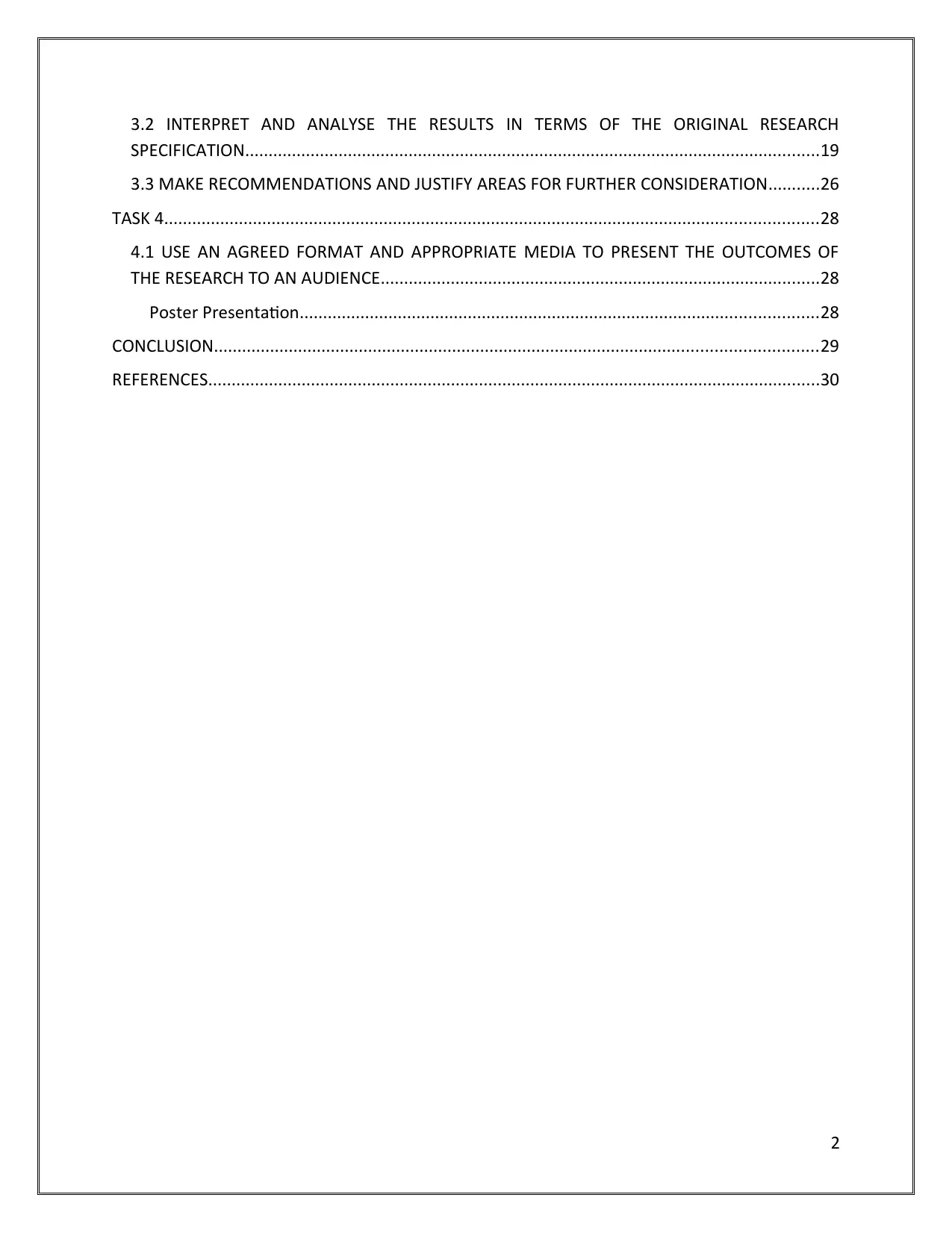
3.2 INTERPRET AND ANALYSE THE RESULTS IN TERMS OF THE ORIGINAL RESEARCH
SPECIFICATION...........................................................................................................................19
3.3 MAKE RECOMMENDATIONS AND JUSTIFY AREAS FOR FURTHER CONSIDERATION...........26
TASK 4............................................................................................................................................28
4.1 USE AN AGREED FORMAT AND APPROPRIATE MEDIA TO PRESENT THE OUTCOMES OF
THE RESEARCH TO AN AUDIENCE..............................................................................................28
Poster Presentation...............................................................................................................28
CONCLUSION.................................................................................................................................29
REFERENCES...................................................................................................................................30
2
SPECIFICATION...........................................................................................................................19
3.3 MAKE RECOMMENDATIONS AND JUSTIFY AREAS FOR FURTHER CONSIDERATION...........26
TASK 4............................................................................................................................................28
4.1 USE AN AGREED FORMAT AND APPROPRIATE MEDIA TO PRESENT THE OUTCOMES OF
THE RESEARCH TO AN AUDIENCE..............................................................................................28
Poster Presentation...............................................................................................................28
CONCLUSION.................................................................................................................................29
REFERENCES...................................................................................................................................30
2
⊘ This is a preview!⊘
Do you want full access?
Subscribe today to unlock all pages.

Trusted by 1+ million students worldwide
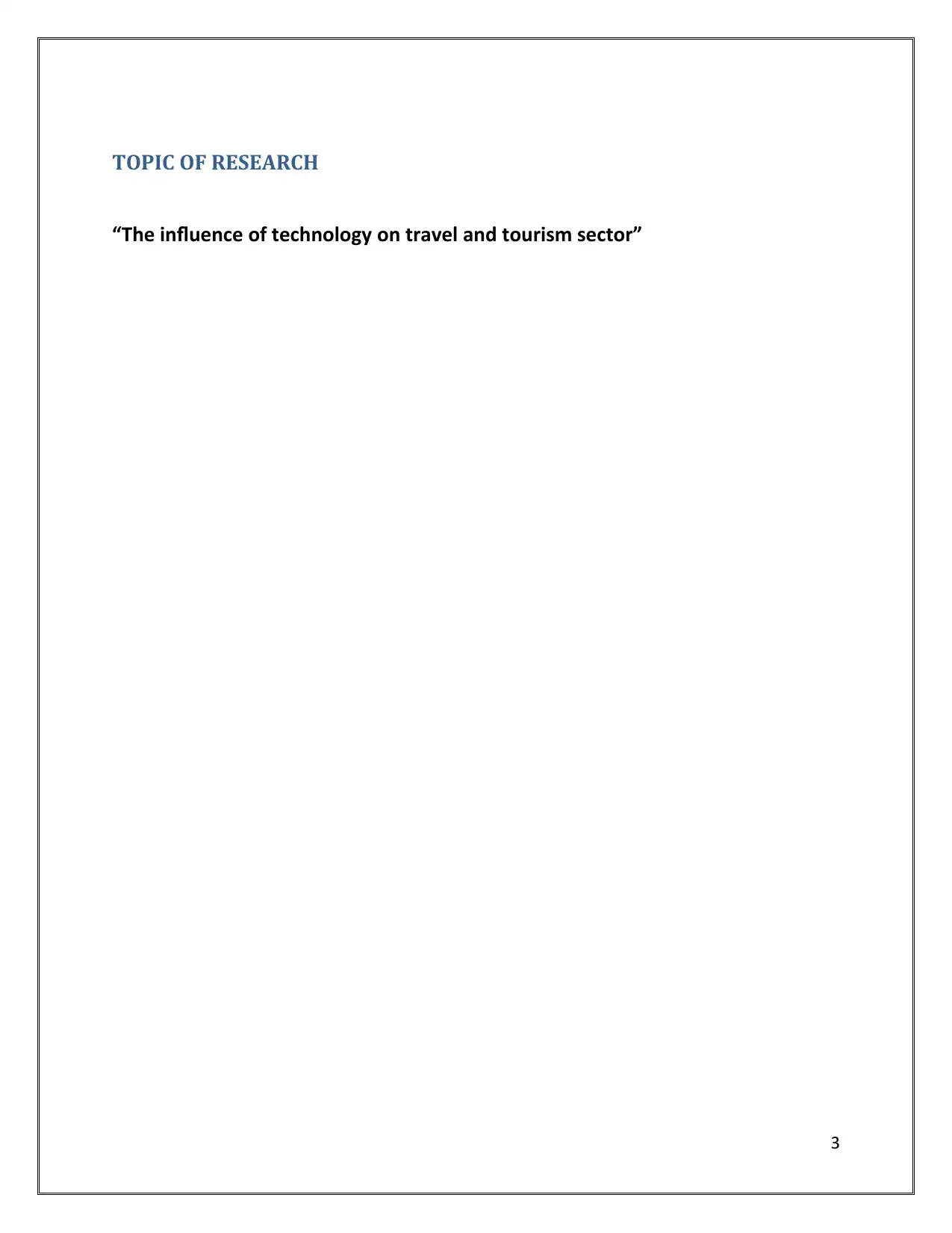
TOPIC OF RESEARCH
“The influence of technology on travel and tourism sector”
3
“The influence of technology on travel and tourism sector”
3
Paraphrase This Document
Need a fresh take? Get an instant paraphrase of this document with our AI Paraphraser
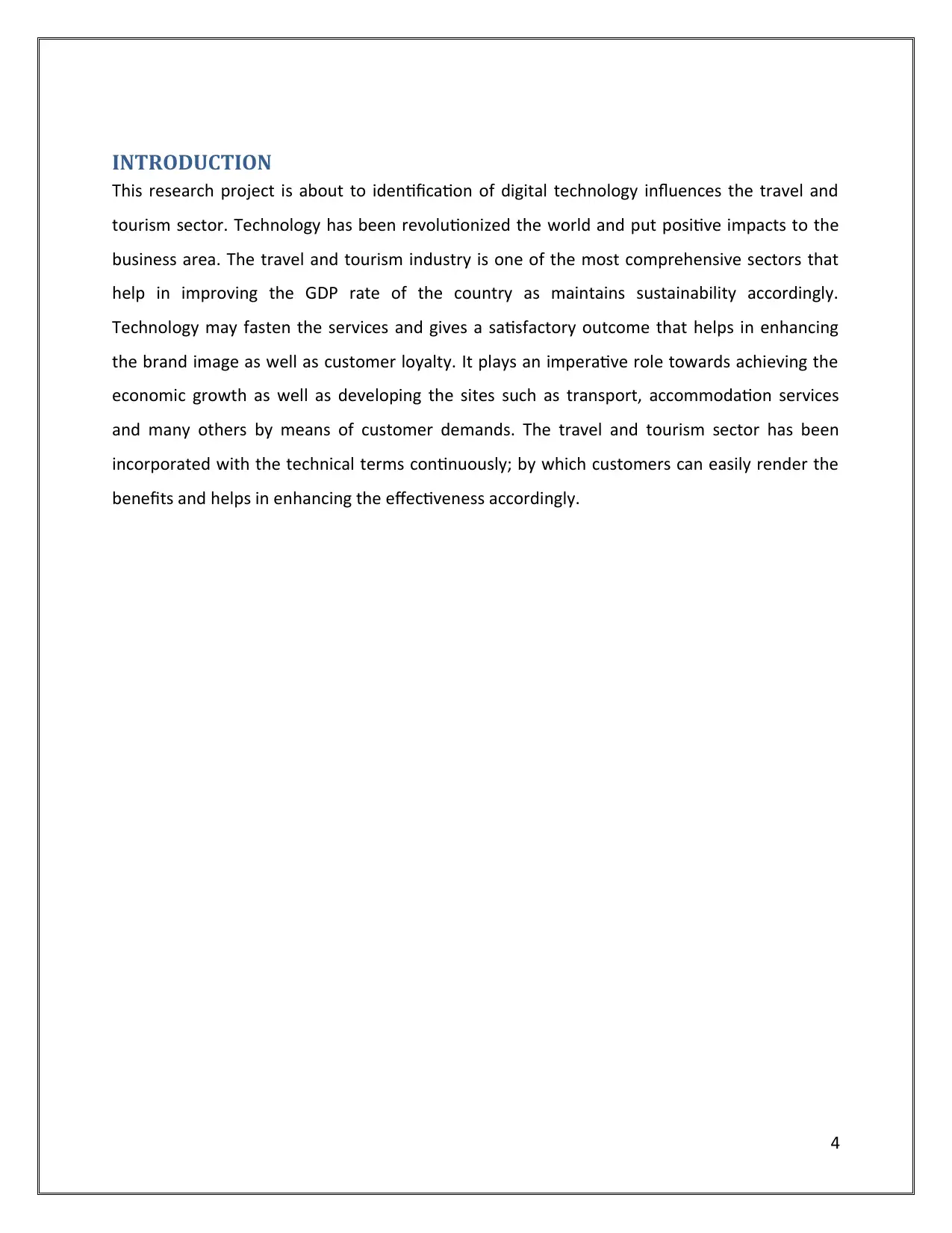
INTRODUCTION
This research project is about to identification of digital technology influences the travel and
tourism sector. Technology has been revolutionized the world and put positive impacts to the
business area. The travel and tourism industry is one of the most comprehensive sectors that
help in improving the GDP rate of the country as maintains sustainability accordingly.
Technology may fasten the services and gives a satisfactory outcome that helps in enhancing
the brand image as well as customer loyalty. It plays an imperative role towards achieving the
economic growth as well as developing the sites such as transport, accommodation services
and many others by means of customer demands. The travel and tourism sector has been
incorporated with the technical terms continuously; by which customers can easily render the
benefits and helps in enhancing the effectiveness accordingly.
4
This research project is about to identification of digital technology influences the travel and
tourism sector. Technology has been revolutionized the world and put positive impacts to the
business area. The travel and tourism industry is one of the most comprehensive sectors that
help in improving the GDP rate of the country as maintains sustainability accordingly.
Technology may fasten the services and gives a satisfactory outcome that helps in enhancing
the brand image as well as customer loyalty. It plays an imperative role towards achieving the
economic growth as well as developing the sites such as transport, accommodation services
and many others by means of customer demands. The travel and tourism sector has been
incorporated with the technical terms continuously; by which customers can easily render the
benefits and helps in enhancing the effectiveness accordingly.
4
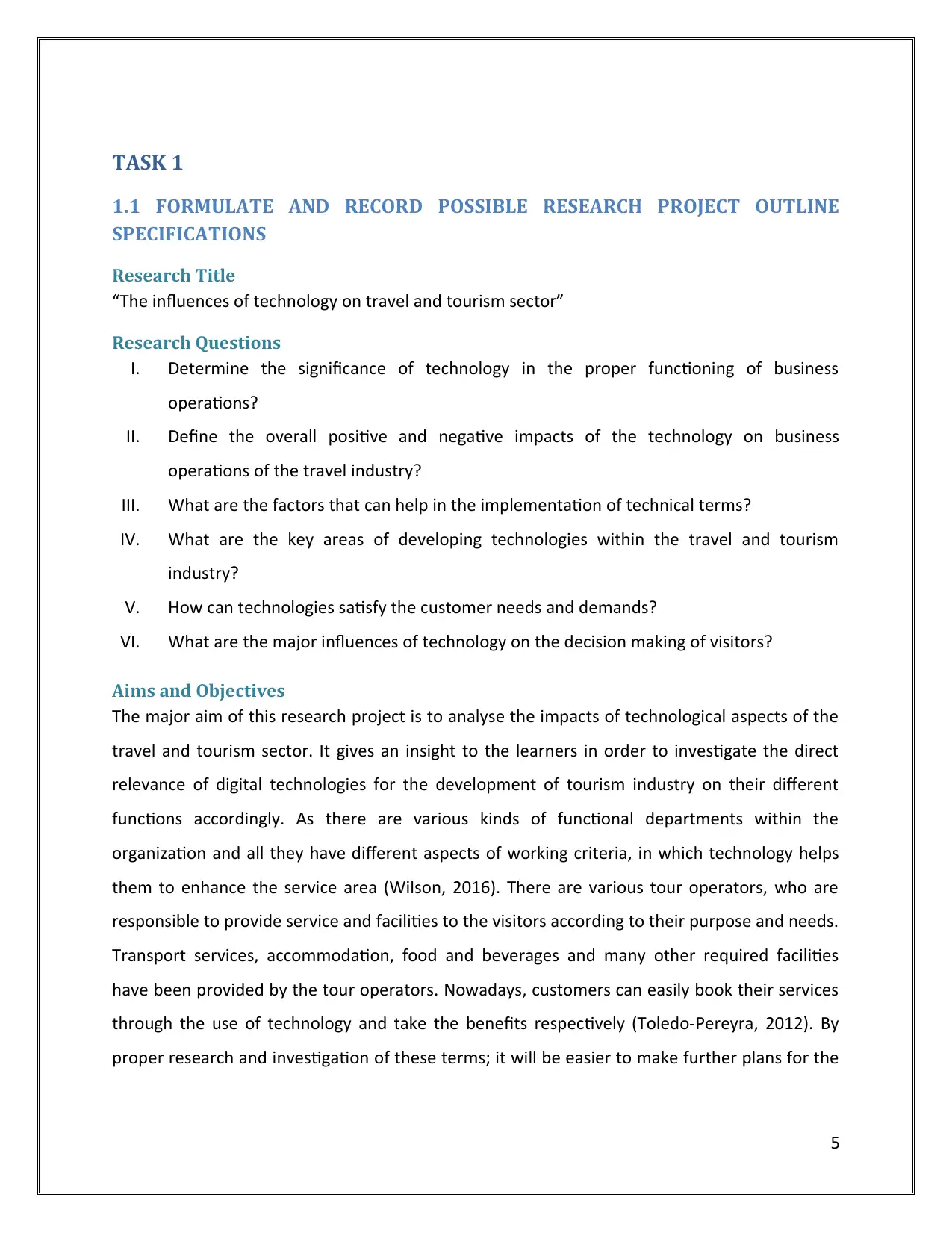
TASK 1
1.1 FORMULATE AND RECORD POSSIBLE RESEARCH PROJECT OUTLINE
SPECIFICATIONS
Research Title
“The influences of technology on travel and tourism sector”
Research Questions
I. Determine the significance of technology in the proper functioning of business
operations?
II. Define the overall positive and negative impacts of the technology on business
operations of the travel industry?
III. What are the factors that can help in the implementation of technical terms?
IV. What are the key areas of developing technologies within the travel and tourism
industry?
V. How can technologies satisfy the customer needs and demands?
VI. What are the major influences of technology on the decision making of visitors?
Aims and Objectives
The major aim of this research project is to analyse the impacts of technological aspects of the
travel and tourism sector. It gives an insight to the learners in order to investigate the direct
relevance of digital technologies for the development of tourism industry on their different
functions accordingly. As there are various kinds of functional departments within the
organization and all they have different aspects of working criteria, in which technology helps
them to enhance the service area (Wilson, 2016). There are various tour operators, who are
responsible to provide service and facilities to the visitors according to their purpose and needs.
Transport services, accommodation, food and beverages and many other required facilities
have been provided by the tour operators. Nowadays, customers can easily book their services
through the use of technology and take the benefits respectively (Toledo-Pereyra, 2012). By
proper research and investigation of these terms; it will be easier to make further plans for the
5
1.1 FORMULATE AND RECORD POSSIBLE RESEARCH PROJECT OUTLINE
SPECIFICATIONS
Research Title
“The influences of technology on travel and tourism sector”
Research Questions
I. Determine the significance of technology in the proper functioning of business
operations?
II. Define the overall positive and negative impacts of the technology on business
operations of the travel industry?
III. What are the factors that can help in the implementation of technical terms?
IV. What are the key areas of developing technologies within the travel and tourism
industry?
V. How can technologies satisfy the customer needs and demands?
VI. What are the major influences of technology on the decision making of visitors?
Aims and Objectives
The major aim of this research project is to analyse the impacts of technological aspects of the
travel and tourism sector. It gives an insight to the learners in order to investigate the direct
relevance of digital technologies for the development of tourism industry on their different
functions accordingly. As there are various kinds of functional departments within the
organization and all they have different aspects of working criteria, in which technology helps
them to enhance the service area (Wilson, 2016). There are various tour operators, who are
responsible to provide service and facilities to the visitors according to their purpose and needs.
Transport services, accommodation, food and beverages and many other required facilities
have been provided by the tour operators. Nowadays, customers can easily book their services
through the use of technology and take the benefits respectively (Toledo-Pereyra, 2012). By
proper research and investigation of these terms; it will be easier to make further plans for the
5
⊘ This is a preview!⊘
Do you want full access?
Subscribe today to unlock all pages.

Trusted by 1+ million students worldwide
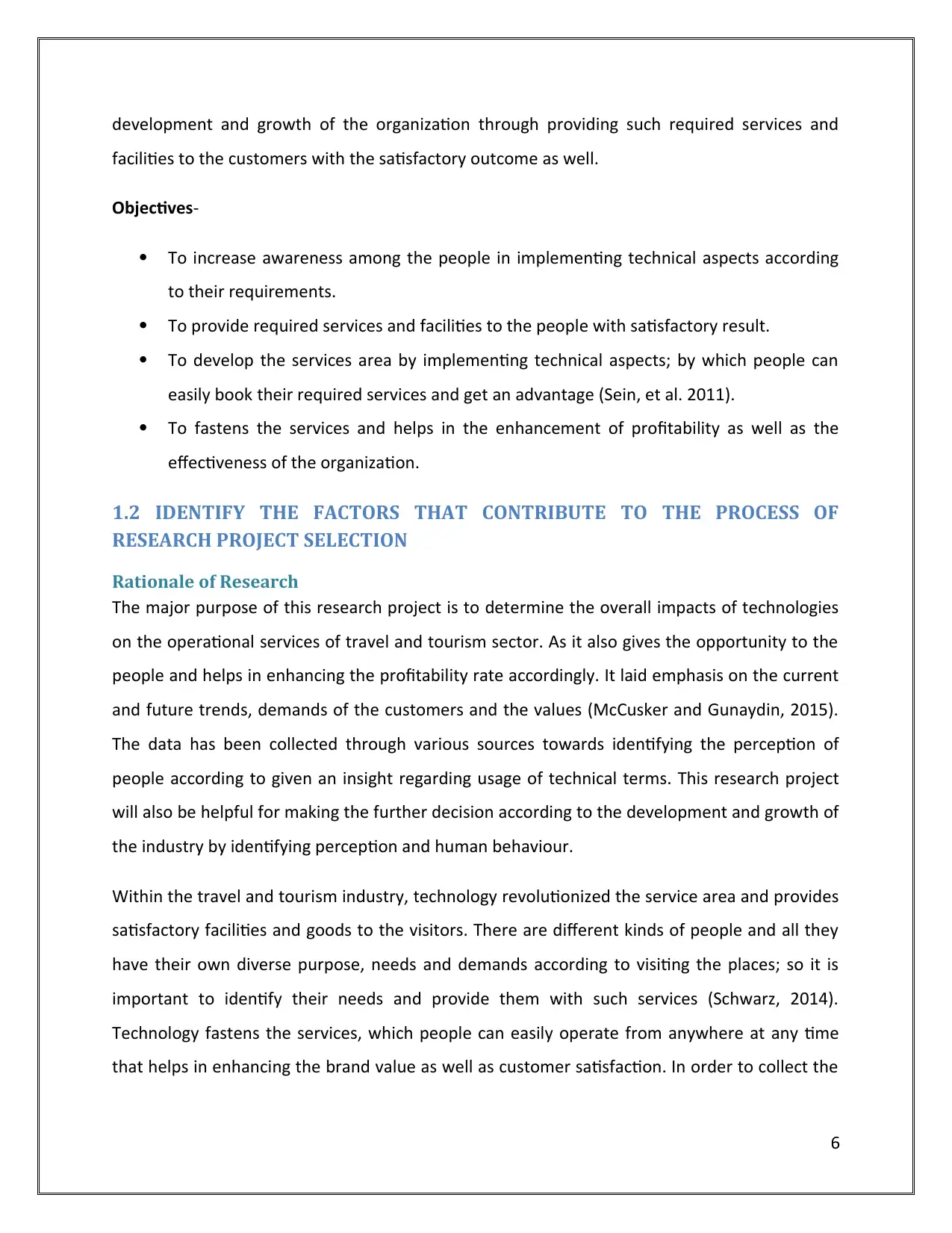
development and growth of the organization through providing such required services and
facilities to the customers with the satisfactory outcome as well.
Objectives-
To increase awareness among the people in implementing technical aspects according
to their requirements.
To provide required services and facilities to the people with satisfactory result.
To develop the services area by implementing technical aspects; by which people can
easily book their required services and get an advantage (Sein, et al. 2011).
To fastens the services and helps in the enhancement of profitability as well as the
effectiveness of the organization.
1.2 IDENTIFY THE FACTORS THAT CONTRIBUTE TO THE PROCESS OF
RESEARCH PROJECT SELECTION
Rationale of Research
The major purpose of this research project is to determine the overall impacts of technologies
on the operational services of travel and tourism sector. As it also gives the opportunity to the
people and helps in enhancing the profitability rate accordingly. It laid emphasis on the current
and future trends, demands of the customers and the values (McCusker and Gunaydin, 2015).
The data has been collected through various sources towards identifying the perception of
people according to given an insight regarding usage of technical terms. This research project
will also be helpful for making the further decision according to the development and growth of
the industry by identifying perception and human behaviour.
Within the travel and tourism industry, technology revolutionized the service area and provides
satisfactory facilities and goods to the visitors. There are different kinds of people and all they
have their own diverse purpose, needs and demands according to visiting the places; so it is
important to identify their needs and provide them with such services (Schwarz, 2014).
Technology fastens the services, which people can easily operate from anywhere at any time
that helps in enhancing the brand value as well as customer satisfaction. In order to collect the
6
facilities to the customers with the satisfactory outcome as well.
Objectives-
To increase awareness among the people in implementing technical aspects according
to their requirements.
To provide required services and facilities to the people with satisfactory result.
To develop the services area by implementing technical aspects; by which people can
easily book their required services and get an advantage (Sein, et al. 2011).
To fastens the services and helps in the enhancement of profitability as well as the
effectiveness of the organization.
1.2 IDENTIFY THE FACTORS THAT CONTRIBUTE TO THE PROCESS OF
RESEARCH PROJECT SELECTION
Rationale of Research
The major purpose of this research project is to determine the overall impacts of technologies
on the operational services of travel and tourism sector. As it also gives the opportunity to the
people and helps in enhancing the profitability rate accordingly. It laid emphasis on the current
and future trends, demands of the customers and the values (McCusker and Gunaydin, 2015).
The data has been collected through various sources towards identifying the perception of
people according to given an insight regarding usage of technical terms. This research project
will also be helpful for making the further decision according to the development and growth of
the industry by identifying perception and human behaviour.
Within the travel and tourism industry, technology revolutionized the service area and provides
satisfactory facilities and goods to the visitors. There are different kinds of people and all they
have their own diverse purpose, needs and demands according to visiting the places; so it is
important to identify their needs and provide them with such services (Schwarz, 2014).
Technology fastens the services, which people can easily operate from anywhere at any time
that helps in enhancing the brand value as well as customer satisfaction. In order to collect the
6
Paraphrase This Document
Need a fresh take? Get an instant paraphrase of this document with our AI Paraphraser
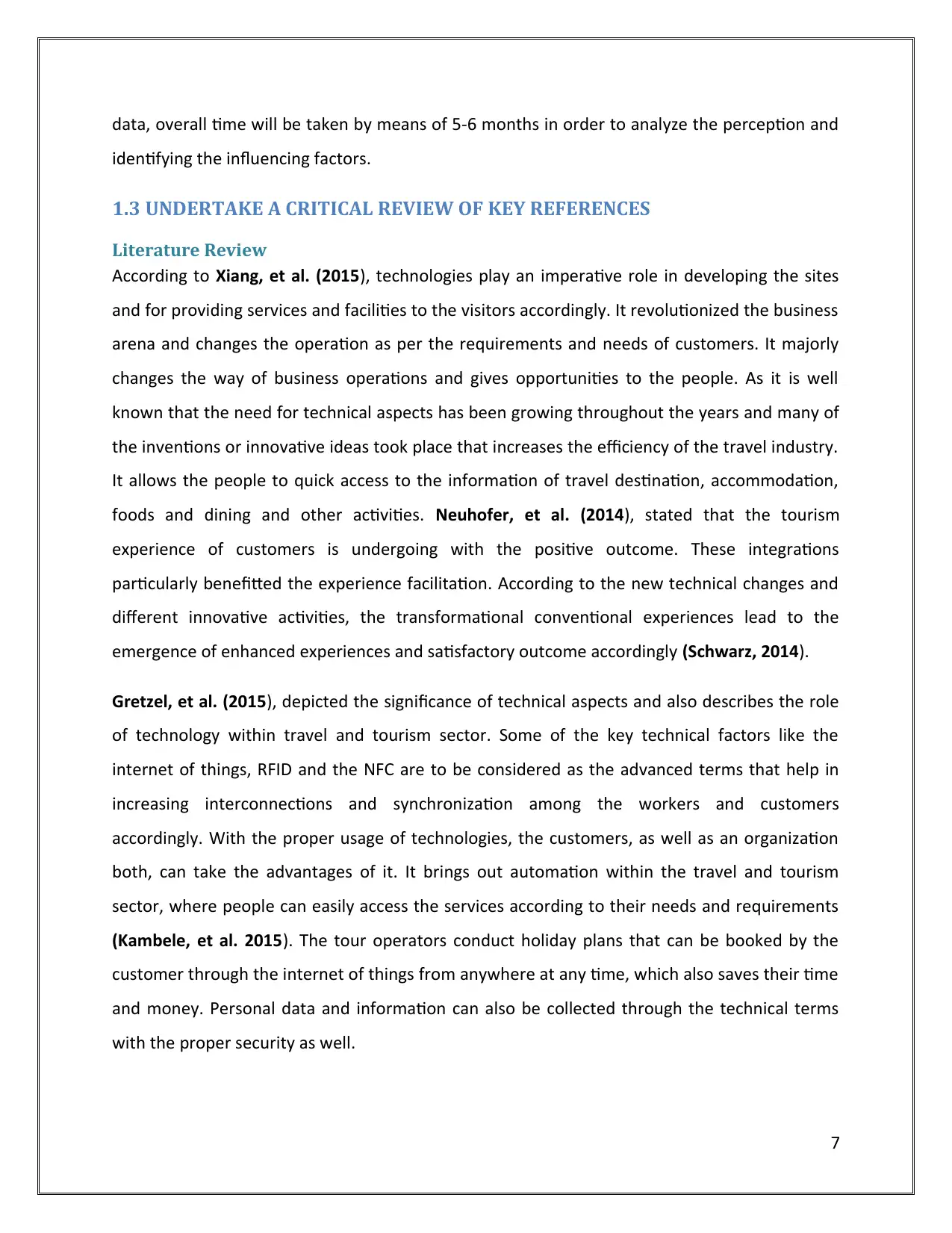
data, overall time will be taken by means of 5-6 months in order to analyze the perception and
identifying the influencing factors.
1.3 UNDERTAKE A CRITICAL REVIEW OF KEY REFERENCES
Literature Review
According to Xiang, et al. (2015), technologies play an imperative role in developing the sites
and for providing services and facilities to the visitors accordingly. It revolutionized the business
arena and changes the operation as per the requirements and needs of customers. It majorly
changes the way of business operations and gives opportunities to the people. As it is well
known that the need for technical aspects has been growing throughout the years and many of
the inventions or innovative ideas took place that increases the efficiency of the travel industry.
It allows the people to quick access to the information of travel destination, accommodation,
foods and dining and other activities. Neuhofer, et al. (2014), stated that the tourism
experience of customers is undergoing with the positive outcome. These integrations
particularly benefitted the experience facilitation. According to the new technical changes and
different innovative activities, the transformational conventional experiences lead to the
emergence of enhanced experiences and satisfactory outcome accordingly (Schwarz, 2014).
Gretzel, et al. (2015), depicted the significance of technical aspects and also describes the role
of technology within travel and tourism sector. Some of the key technical factors like the
internet of things, RFID and the NFC are to be considered as the advanced terms that help in
increasing interconnections and synchronization among the workers and customers
accordingly. With the proper usage of technologies, the customers, as well as an organization
both, can take the advantages of it. It brings out automation within the travel and tourism
sector, where people can easily access the services according to their needs and requirements
(Kambele, et al. 2015). The tour operators conduct holiday plans that can be booked by the
customer through the internet of things from anywhere at any time, which also saves their time
and money. Personal data and information can also be collected through the technical terms
with the proper security as well.
7
identifying the influencing factors.
1.3 UNDERTAKE A CRITICAL REVIEW OF KEY REFERENCES
Literature Review
According to Xiang, et al. (2015), technologies play an imperative role in developing the sites
and for providing services and facilities to the visitors accordingly. It revolutionized the business
arena and changes the operation as per the requirements and needs of customers. It majorly
changes the way of business operations and gives opportunities to the people. As it is well
known that the need for technical aspects has been growing throughout the years and many of
the inventions or innovative ideas took place that increases the efficiency of the travel industry.
It allows the people to quick access to the information of travel destination, accommodation,
foods and dining and other activities. Neuhofer, et al. (2014), stated that the tourism
experience of customers is undergoing with the positive outcome. These integrations
particularly benefitted the experience facilitation. According to the new technical changes and
different innovative activities, the transformational conventional experiences lead to the
emergence of enhanced experiences and satisfactory outcome accordingly (Schwarz, 2014).
Gretzel, et al. (2015), depicted the significance of technical aspects and also describes the role
of technology within travel and tourism sector. Some of the key technical factors like the
internet of things, RFID and the NFC are to be considered as the advanced terms that help in
increasing interconnections and synchronization among the workers and customers
accordingly. With the proper usage of technologies, the customers, as well as an organization
both, can take the advantages of it. It brings out automation within the travel and tourism
sector, where people can easily access the services according to their needs and requirements
(Kambele, et al. 2015). The tour operators conduct holiday plans that can be booked by the
customer through the internet of things from anywhere at any time, which also saves their time
and money. Personal data and information can also be collected through the technical terms
with the proper security as well.
7
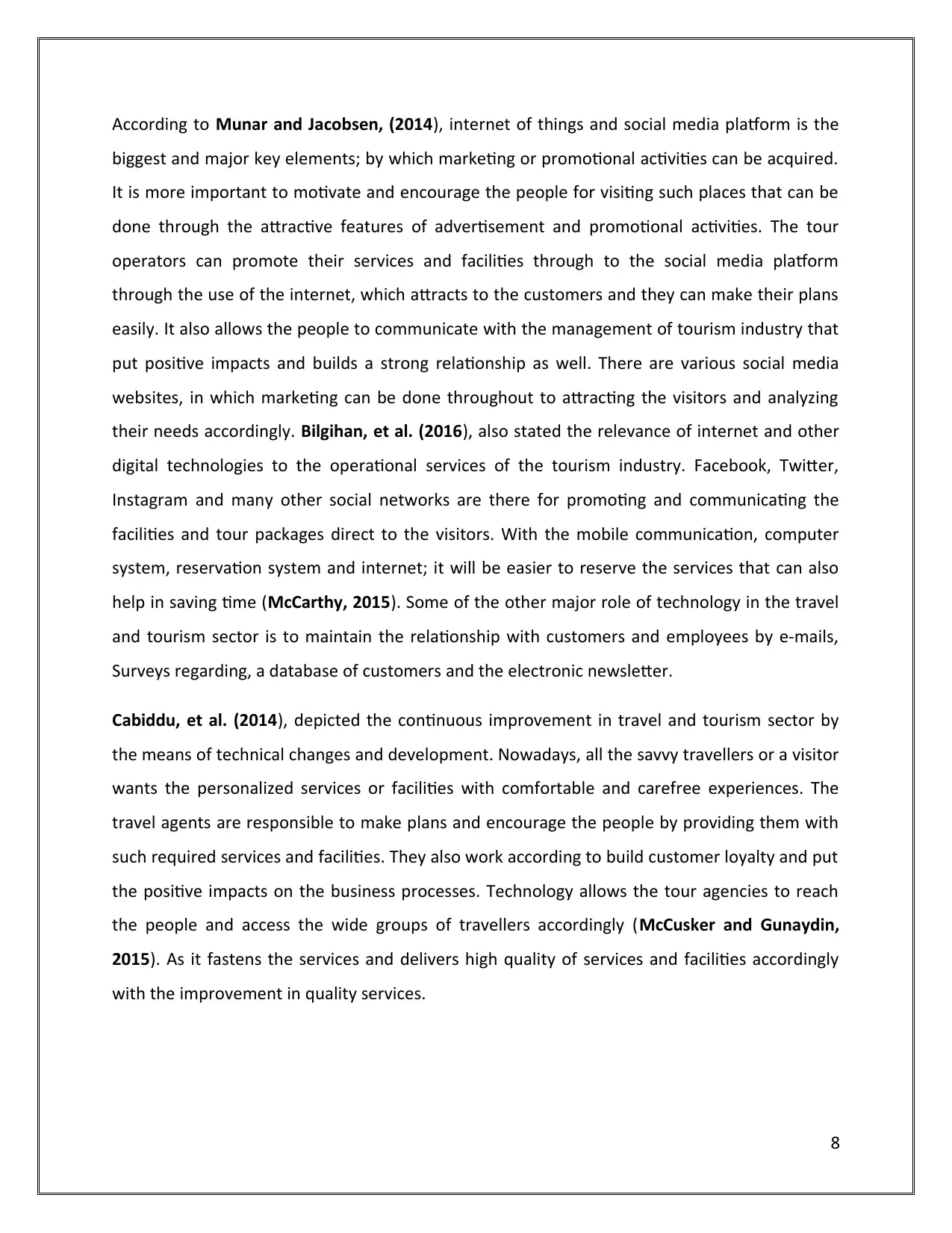
According to Munar and Jacobsen, (2014), internet of things and social media platform is the
biggest and major key elements; by which marketing or promotional activities can be acquired.
It is more important to motivate and encourage the people for visiting such places that can be
done through the attractive features of advertisement and promotional activities. The tour
operators can promote their services and facilities through to the social media platform
through the use of the internet, which attracts to the customers and they can make their plans
easily. It also allows the people to communicate with the management of tourism industry that
put positive impacts and builds a strong relationship as well. There are various social media
websites, in which marketing can be done throughout to attracting the visitors and analyzing
their needs accordingly. Bilgihan, et al. (2016), also stated the relevance of internet and other
digital technologies to the operational services of the tourism industry. Facebook, Twitter,
Instagram and many other social networks are there for promoting and communicating the
facilities and tour packages direct to the visitors. With the mobile communication, computer
system, reservation system and internet; it will be easier to reserve the services that can also
help in saving time (McCarthy, 2015). Some of the other major role of technology in the travel
and tourism sector is to maintain the relationship with customers and employees by e-mails,
Surveys regarding, a database of customers and the electronic newsletter.
Cabiddu, et al. (2014), depicted the continuous improvement in travel and tourism sector by
the means of technical changes and development. Nowadays, all the savvy travellers or a visitor
wants the personalized services or facilities with comfortable and carefree experiences. The
travel agents are responsible to make plans and encourage the people by providing them with
such required services and facilities. They also work according to build customer loyalty and put
the positive impacts on the business processes. Technology allows the tour agencies to reach
the people and access the wide groups of travellers accordingly (McCusker and Gunaydin,
2015). As it fastens the services and delivers high quality of services and facilities accordingly
with the improvement in quality services.
8
biggest and major key elements; by which marketing or promotional activities can be acquired.
It is more important to motivate and encourage the people for visiting such places that can be
done through the attractive features of advertisement and promotional activities. The tour
operators can promote their services and facilities through to the social media platform
through the use of the internet, which attracts to the customers and they can make their plans
easily. It also allows the people to communicate with the management of tourism industry that
put positive impacts and builds a strong relationship as well. There are various social media
websites, in which marketing can be done throughout to attracting the visitors and analyzing
their needs accordingly. Bilgihan, et al. (2016), also stated the relevance of internet and other
digital technologies to the operational services of the tourism industry. Facebook, Twitter,
Instagram and many other social networks are there for promoting and communicating the
facilities and tour packages direct to the visitors. With the mobile communication, computer
system, reservation system and internet; it will be easier to reserve the services that can also
help in saving time (McCarthy, 2015). Some of the other major role of technology in the travel
and tourism sector is to maintain the relationship with customers and employees by e-mails,
Surveys regarding, a database of customers and the electronic newsletter.
Cabiddu, et al. (2014), depicted the continuous improvement in travel and tourism sector by
the means of technical changes and development. Nowadays, all the savvy travellers or a visitor
wants the personalized services or facilities with comfortable and carefree experiences. The
travel agents are responsible to make plans and encourage the people by providing them with
such required services and facilities. They also work according to build customer loyalty and put
the positive impacts on the business processes. Technology allows the tour agencies to reach
the people and access the wide groups of travellers accordingly (McCusker and Gunaydin,
2015). As it fastens the services and delivers high quality of services and facilities accordingly
with the improvement in quality services.
8
⊘ This is a preview!⊘
Do you want full access?
Subscribe today to unlock all pages.

Trusted by 1+ million students worldwide
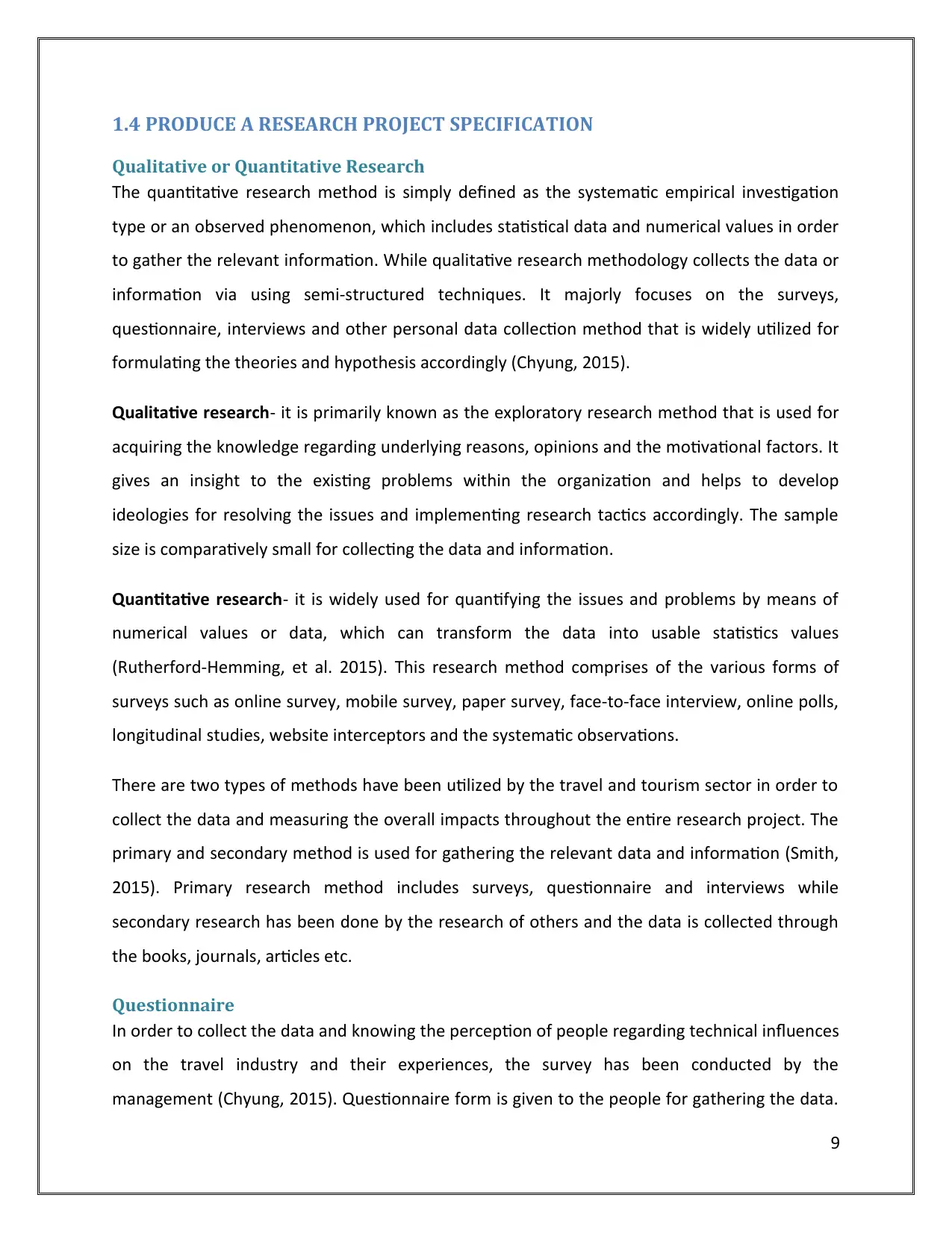
1.4 PRODUCE A RESEARCH PROJECT SPECIFICATION
Qualitative or Quantitative Research
The quantitative research method is simply defined as the systematic empirical investigation
type or an observed phenomenon, which includes statistical data and numerical values in order
to gather the relevant information. While qualitative research methodology collects the data or
information via using semi-structured techniques. It majorly focuses on the surveys,
questionnaire, interviews and other personal data collection method that is widely utilized for
formulating the theories and hypothesis accordingly (Chyung, 2015).
Qualitative research- it is primarily known as the exploratory research method that is used for
acquiring the knowledge regarding underlying reasons, opinions and the motivational factors. It
gives an insight to the existing problems within the organization and helps to develop
ideologies for resolving the issues and implementing research tactics accordingly. The sample
size is comparatively small for collecting the data and information.
Quantitative research- it is widely used for quantifying the issues and problems by means of
numerical values or data, which can transform the data into usable statistics values
(Rutherford-Hemming, et al. 2015). This research method comprises of the various forms of
surveys such as online survey, mobile survey, paper survey, face-to-face interview, online polls,
longitudinal studies, website interceptors and the systematic observations.
There are two types of methods have been utilized by the travel and tourism sector in order to
collect the data and measuring the overall impacts throughout the entire research project. The
primary and secondary method is used for gathering the relevant data and information (Smith,
2015). Primary research method includes surveys, questionnaire and interviews while
secondary research has been done by the research of others and the data is collected through
the books, journals, articles etc.
Questionnaire
In order to collect the data and knowing the perception of people regarding technical influences
on the travel industry and their experiences, the survey has been conducted by the
management (Chyung, 2015). Questionnaire form is given to the people for gathering the data.
9
Qualitative or Quantitative Research
The quantitative research method is simply defined as the systematic empirical investigation
type or an observed phenomenon, which includes statistical data and numerical values in order
to gather the relevant information. While qualitative research methodology collects the data or
information via using semi-structured techniques. It majorly focuses on the surveys,
questionnaire, interviews and other personal data collection method that is widely utilized for
formulating the theories and hypothesis accordingly (Chyung, 2015).
Qualitative research- it is primarily known as the exploratory research method that is used for
acquiring the knowledge regarding underlying reasons, opinions and the motivational factors. It
gives an insight to the existing problems within the organization and helps to develop
ideologies for resolving the issues and implementing research tactics accordingly. The sample
size is comparatively small for collecting the data and information.
Quantitative research- it is widely used for quantifying the issues and problems by means of
numerical values or data, which can transform the data into usable statistics values
(Rutherford-Hemming, et al. 2015). This research method comprises of the various forms of
surveys such as online survey, mobile survey, paper survey, face-to-face interview, online polls,
longitudinal studies, website interceptors and the systematic observations.
There are two types of methods have been utilized by the travel and tourism sector in order to
collect the data and measuring the overall impacts throughout the entire research project. The
primary and secondary method is used for gathering the relevant data and information (Smith,
2015). Primary research method includes surveys, questionnaire and interviews while
secondary research has been done by the research of others and the data is collected through
the books, journals, articles etc.
Questionnaire
In order to collect the data and knowing the perception of people regarding technical influences
on the travel industry and their experiences, the survey has been conducted by the
management (Chyung, 2015). Questionnaire form is given to the people for gathering the data.
9
Paraphrase This Document
Need a fresh take? Get an instant paraphrase of this document with our AI Paraphraser
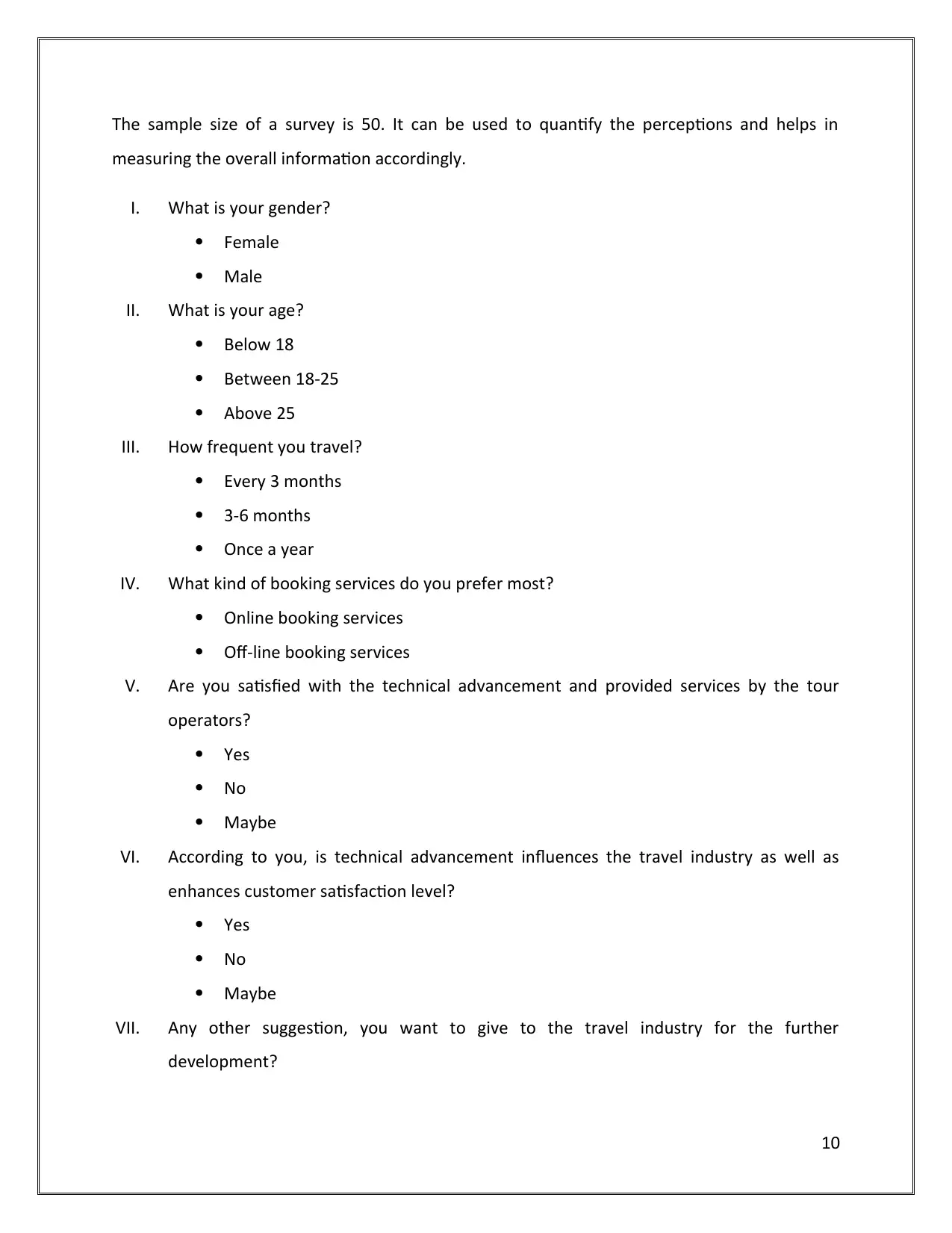
The sample size of a survey is 50. It can be used to quantify the perceptions and helps in
measuring the overall information accordingly.
I. What is your gender?
Female
Male
II. What is your age?
Below 18
Between 18-25
Above 25
III. How frequent you travel?
Every 3 months
3-6 months
Once a year
IV. What kind of booking services do you prefer most?
Online booking services
Off-line booking services
V. Are you satisfied with the technical advancement and provided services by the tour
operators?
Yes
No
Maybe
VI. According to you, is technical advancement influences the travel industry as well as
enhances customer satisfaction level?
Yes
No
Maybe
VII. Any other suggestion, you want to give to the travel industry for the further
development?
10
measuring the overall information accordingly.
I. What is your gender?
Female
Male
II. What is your age?
Below 18
Between 18-25
Above 25
III. How frequent you travel?
Every 3 months
3-6 months
Once a year
IV. What kind of booking services do you prefer most?
Online booking services
Off-line booking services
V. Are you satisfied with the technical advancement and provided services by the tour
operators?
Yes
No
Maybe
VI. According to you, is technical advancement influences the travel industry as well as
enhances customer satisfaction level?
Yes
No
Maybe
VII. Any other suggestion, you want to give to the travel industry for the further
development?
10
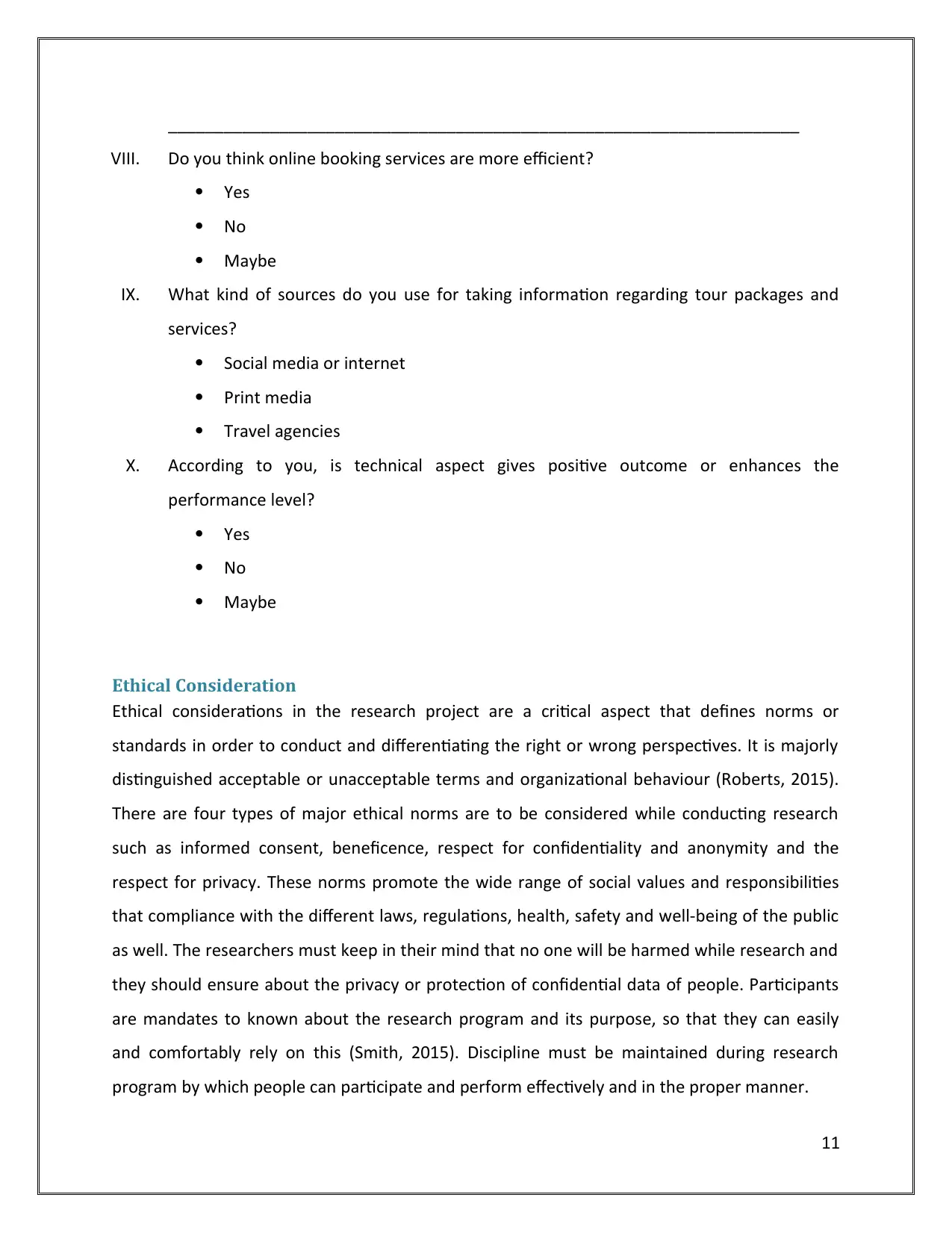
____________________________________________________________________
VIII. Do you think online booking services are more efficient?
Yes
No
Maybe
IX. What kind of sources do you use for taking information regarding tour packages and
services?
Social media or internet
Print media
Travel agencies
X. According to you, is technical aspect gives positive outcome or enhances the
performance level?
Yes
No
Maybe
Ethical Consideration
Ethical considerations in the research project are a critical aspect that defines norms or
standards in order to conduct and differentiating the right or wrong perspectives. It is majorly
distinguished acceptable or unacceptable terms and organizational behaviour (Roberts, 2015).
There are four types of major ethical norms are to be considered while conducting research
such as informed consent, beneficence, respect for confidentiality and anonymity and the
respect for privacy. These norms promote the wide range of social values and responsibilities
that compliance with the different laws, regulations, health, safety and well-being of the public
as well. The researchers must keep in their mind that no one will be harmed while research and
they should ensure about the privacy or protection of confidential data of people. Participants
are mandates to known about the research program and its purpose, so that they can easily
and comfortably rely on this (Smith, 2015). Discipline must be maintained during research
program by which people can participate and perform effectively and in the proper manner.
11
VIII. Do you think online booking services are more efficient?
Yes
No
Maybe
IX. What kind of sources do you use for taking information regarding tour packages and
services?
Social media or internet
Print media
Travel agencies
X. According to you, is technical aspect gives positive outcome or enhances the
performance level?
Yes
No
Maybe
Ethical Consideration
Ethical considerations in the research project are a critical aspect that defines norms or
standards in order to conduct and differentiating the right or wrong perspectives. It is majorly
distinguished acceptable or unacceptable terms and organizational behaviour (Roberts, 2015).
There are four types of major ethical norms are to be considered while conducting research
such as informed consent, beneficence, respect for confidentiality and anonymity and the
respect for privacy. These norms promote the wide range of social values and responsibilities
that compliance with the different laws, regulations, health, safety and well-being of the public
as well. The researchers must keep in their mind that no one will be harmed while research and
they should ensure about the privacy or protection of confidential data of people. Participants
are mandates to known about the research program and its purpose, so that they can easily
and comfortably rely on this (Smith, 2015). Discipline must be maintained during research
program by which people can participate and perform effectively and in the proper manner.
11
⊘ This is a preview!⊘
Do you want full access?
Subscribe today to unlock all pages.

Trusted by 1+ million students worldwide
1 out of 32
Related Documents
Your All-in-One AI-Powered Toolkit for Academic Success.
+13062052269
info@desklib.com
Available 24*7 on WhatsApp / Email
![[object Object]](/_next/static/media/star-bottom.7253800d.svg)
Unlock your academic potential
Copyright © 2020–2026 A2Z Services. All Rights Reserved. Developed and managed by ZUCOL.




